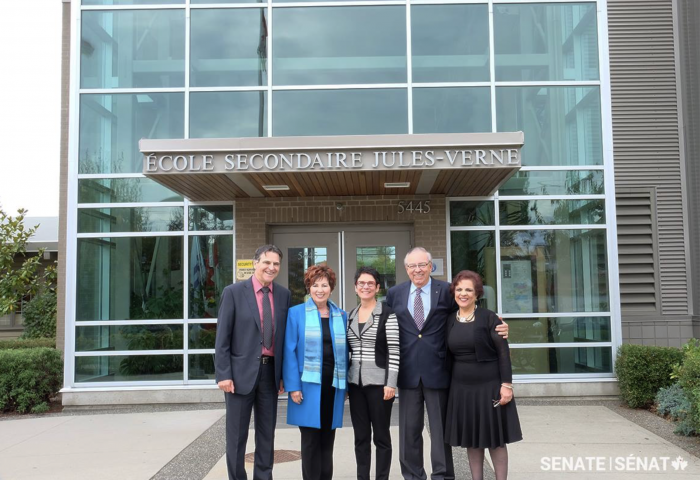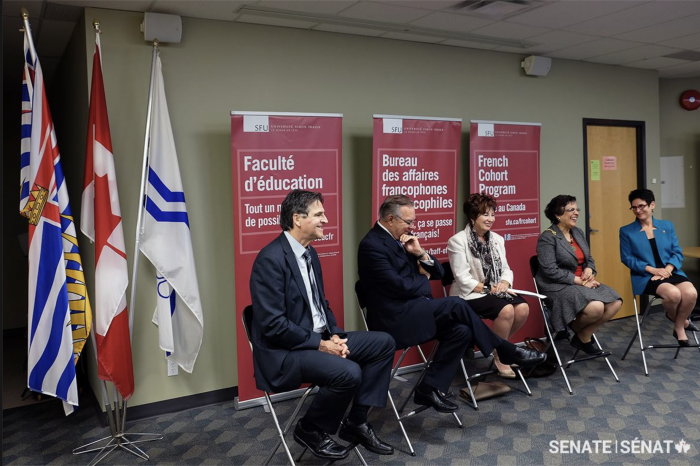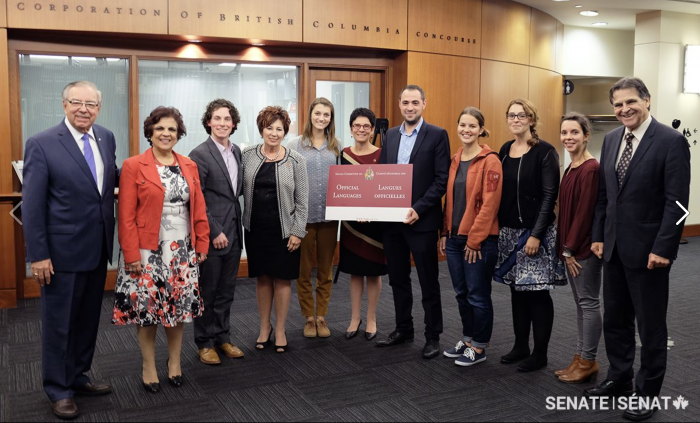Supporting French education in B.C.

The Senate Committee on Official Languages is studying the challenges students and parents face to access French-language schools and French immersion programs in British Columbia.
The study comes a year after the committee reported on the importance of strengthening bilingualism in Canada. Moreover, the Supreme Court of British Columbia recently ruled that the minority language rights of francophone students guaranteed by the Canadian Charter of Rights and Freedoms are being violated in that province.
The committee recently traveled to Vancouver and Victoria on a fact-finding mission and will hold public hearings in order to learn directly from the communities affected.
Francophone schools in British Columbia are suffering from a lack of basic infrastructure and government support, senators heard during a fact-finding mission to Vancouver and Victoria. French immersion programs also face specific challenges in that province, in particular with the shortage of French teachers.
Members of the Senate Committee on Official Languages travelled to B.C. during the week of October 3, 2016 to learn more about the state of the province’s French education programming.
The challenges associated with access to Francophone schools and French Immersion Programs in British-Columbia deserve a thorough examination,” Committee Chair Senator Claudette Tardif said during public hearings in Vancouver.
Senator Tardif was joined by Senators Paul McIntyre, Raymonde Gagné, Mobina Jaffer and Ghislain Maltais as they discussed French-language education with diverse associations, school groups, parents, teachers, researchers and students.
Witnesses said French-language education funding must be made a priority in British Columbia, and that programs require more support from the federal and provincial governments, both for Francophone schools and French Immersion Programs.
Senator McIntyre said this support is crucial.
“There is definitely a lack of leadership, not only in this province, but across the country when it comes to promoting the issue of bilingualism,” he said.
The committee heard that a lack of Francophone schools and inadequate existing infrastructure is causing accessibility problems resulting in a loss of early childhood education opportunities,extra-curricular activities and, ultimately, registrations. School transportation is also a huge issue as the extra-long commutes discourage many parents from enrolling their children.
During public hearings, witnesses placed a particular emphasis on the shortage of qualified French teachers. There is no provincial standard for French immersion or basic French teaching qualifications; witnesses recommended that a minimum language threshold be established in British Columbia and across Canada.
One message came through with particular clarity.
“If you bring just one thing back to Ottawa, it’s that “la francophonie” is alive and well in B.C.,” Bertrand Dupain, Director of the Conseil scolaire francophone de la Colombie-Britannique, told the committee.
“Kids want to speak French. We have a vibrant francophonie and successful programs.”
Senator Tardif said the committee would do everything in its power to make recommendations that would inspire change.
“I can assure you that your voices have been heard, and that we are touched by what you have told us,” she said.
Senators were especially impressed with students attending Francophone schools and French Immersion Programs in Vancouver and Victoria, who spoke at length about the benefits of speaking French, and how speaking both official language was part of the Canadian identity.
Family and community were recurrent themes; students expressed their sense of pride at being bilingual and stressed that studying French is not just about learning a language — it’s also about absorbing a culture. For many immersion students, French was their third language.
Senator Maltais praised the students and suggested they come to speak to the committee in Ottawa.
Senator Gagné said they gave her hope.
« I see in you a profound wisdom which impresses me », Senator Gagné said.
« It gives me confidence in all of you, and confidence in Canada’s future. »Senator Mobina Jaffer expressed her desire to make bilingualism a priority in Canada.
“People think of francophonie as just people from Quebec or France, and that’s not true — we have a very diverse Francophone Community,” Senator Jaffer said.
“I want our children to speak both French and English, it should be a given. It happens in Europe, it happens all over the world, it should happen here.”
Senators will continue their study in Ottawa. They intend to release a report on access to French language education in British Columbia in the coming months.
Related
- See more photos of the committee's trip on Facebook



Related articles
Tags
Committee news
Supporting French education in B.C.

The Senate Committee on Official Languages is studying the challenges students and parents face to access French-language schools and French immersion programs in British Columbia.
The study comes a year after the committee reported on the importance of strengthening bilingualism in Canada. Moreover, the Supreme Court of British Columbia recently ruled that the minority language rights of francophone students guaranteed by the Canadian Charter of Rights and Freedoms are being violated in that province.
The committee recently traveled to Vancouver and Victoria on a fact-finding mission and will hold public hearings in order to learn directly from the communities affected.
Francophone schools in British Columbia are suffering from a lack of basic infrastructure and government support, senators heard during a fact-finding mission to Vancouver and Victoria. French immersion programs also face specific challenges in that province, in particular with the shortage of French teachers.
Members of the Senate Committee on Official Languages travelled to B.C. during the week of October 3, 2016 to learn more about the state of the province’s French education programming.
The challenges associated with access to Francophone schools and French Immersion Programs in British-Columbia deserve a thorough examination,” Committee Chair Senator Claudette Tardif said during public hearings in Vancouver.
Senator Tardif was joined by Senators Paul McIntyre, Raymonde Gagné, Mobina Jaffer and Ghislain Maltais as they discussed French-language education with diverse associations, school groups, parents, teachers, researchers and students.
Witnesses said French-language education funding must be made a priority in British Columbia, and that programs require more support from the federal and provincial governments, both for Francophone schools and French Immersion Programs.
Senator McIntyre said this support is crucial.
“There is definitely a lack of leadership, not only in this province, but across the country when it comes to promoting the issue of bilingualism,” he said.
The committee heard that a lack of Francophone schools and inadequate existing infrastructure is causing accessibility problems resulting in a loss of early childhood education opportunities,extra-curricular activities and, ultimately, registrations. School transportation is also a huge issue as the extra-long commutes discourage many parents from enrolling their children.
During public hearings, witnesses placed a particular emphasis on the shortage of qualified French teachers. There is no provincial standard for French immersion or basic French teaching qualifications; witnesses recommended that a minimum language threshold be established in British Columbia and across Canada.
One message came through with particular clarity.
“If you bring just one thing back to Ottawa, it’s that “la francophonie” is alive and well in B.C.,” Bertrand Dupain, Director of the Conseil scolaire francophone de la Colombie-Britannique, told the committee.
“Kids want to speak French. We have a vibrant francophonie and successful programs.”
Senator Tardif said the committee would do everything in its power to make recommendations that would inspire change.
“I can assure you that your voices have been heard, and that we are touched by what you have told us,” she said.
Senators were especially impressed with students attending Francophone schools and French Immersion Programs in Vancouver and Victoria, who spoke at length about the benefits of speaking French, and how speaking both official language was part of the Canadian identity.
Family and community were recurrent themes; students expressed their sense of pride at being bilingual and stressed that studying French is not just about learning a language — it’s also about absorbing a culture. For many immersion students, French was their third language.
Senator Maltais praised the students and suggested they come to speak to the committee in Ottawa.
Senator Gagné said they gave her hope.
« I see in you a profound wisdom which impresses me », Senator Gagné said.
« It gives me confidence in all of you, and confidence in Canada’s future. »Senator Mobina Jaffer expressed her desire to make bilingualism a priority in Canada.
“People think of francophonie as just people from Quebec or France, and that’s not true — we have a very diverse Francophone Community,” Senator Jaffer said.
“I want our children to speak both French and English, it should be a given. It happens in Europe, it happens all over the world, it should happen here.”
Senators will continue their study in Ottawa. They intend to release a report on access to French language education in British Columbia in the coming months.
Related
- See more photos of the committee's trip on Facebook





